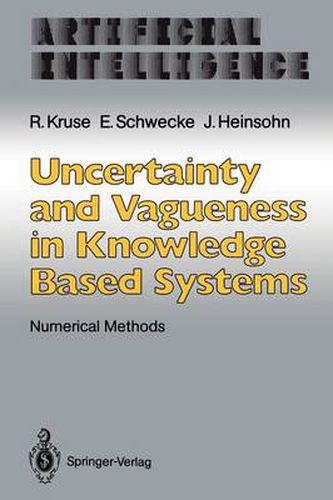Readings Newsletter
Become a Readings Member to make your shopping experience even easier.
Sign in or sign up for free!
You’re not far away from qualifying for FREE standard shipping within Australia
You’ve qualified for FREE standard shipping within Australia
The cart is loading…






This title is printed to order. This book may have been self-published. If so, we cannot guarantee the quality of the content. In the main most books will have gone through the editing process however some may not. We therefore suggest that you be aware of this before ordering this book. If in doubt check either the author or publisher’s details as we are unable to accept any returns unless they are faulty. Please contact us if you have any questions.
The primary aim of this monograph is to provide a formal framework for the representation and management of uncertainty and vagueness in the field of artificial intelligence. It puts particular emphasis on a thorough analysis of these phenomena and on the development of sound mathematical modeling approaches. Beyond this theoretical basis the scope of the book includes also implementational aspects and a valuation of existing models and systems. The fundamental ambition of this book is to show that vagueness and un certainty can be handled adequately by using measure-theoretic methods. The presentation of applicable knowledge representation formalisms and reasoning algorithms substantiates the claim that efficiency requirements do not necessar ily require renunciation of an uncompromising mathematical modeling. These results are used to evaluate systems based on probabilistic methods as well as on non-standard concepts such as certainty factors, fuzzy sets or belief functions. The book is intended to be self-contained and addresses researchers and practioneers in the field of knowledge based systems. It is in particular suit able as a textbook for graduate-level students in AI, operations research and applied probability. A solid mathematical background is necessary for reading this book. Essential parts of the material have been the subject of courses given by the first author for students of computer science and mathematics held since 1984 at the University in Braunschweig.
$9.00 standard shipping within Australia
FREE standard shipping within Australia for orders over $100.00
Express & International shipping calculated at checkout
This title is printed to order. This book may have been self-published. If so, we cannot guarantee the quality of the content. In the main most books will have gone through the editing process however some may not. We therefore suggest that you be aware of this before ordering this book. If in doubt check either the author or publisher’s details as we are unable to accept any returns unless they are faulty. Please contact us if you have any questions.
The primary aim of this monograph is to provide a formal framework for the representation and management of uncertainty and vagueness in the field of artificial intelligence. It puts particular emphasis on a thorough analysis of these phenomena and on the development of sound mathematical modeling approaches. Beyond this theoretical basis the scope of the book includes also implementational aspects and a valuation of existing models and systems. The fundamental ambition of this book is to show that vagueness and un certainty can be handled adequately by using measure-theoretic methods. The presentation of applicable knowledge representation formalisms and reasoning algorithms substantiates the claim that efficiency requirements do not necessar ily require renunciation of an uncompromising mathematical modeling. These results are used to evaluate systems based on probabilistic methods as well as on non-standard concepts such as certainty factors, fuzzy sets or belief functions. The book is intended to be self-contained and addresses researchers and practioneers in the field of knowledge based systems. It is in particular suit able as a textbook for graduate-level students in AI, operations research and applied probability. A solid mathematical background is necessary for reading this book. Essential parts of the material have been the subject of courses given by the first author for students of computer science and mathematics held since 1984 at the University in Braunschweig.